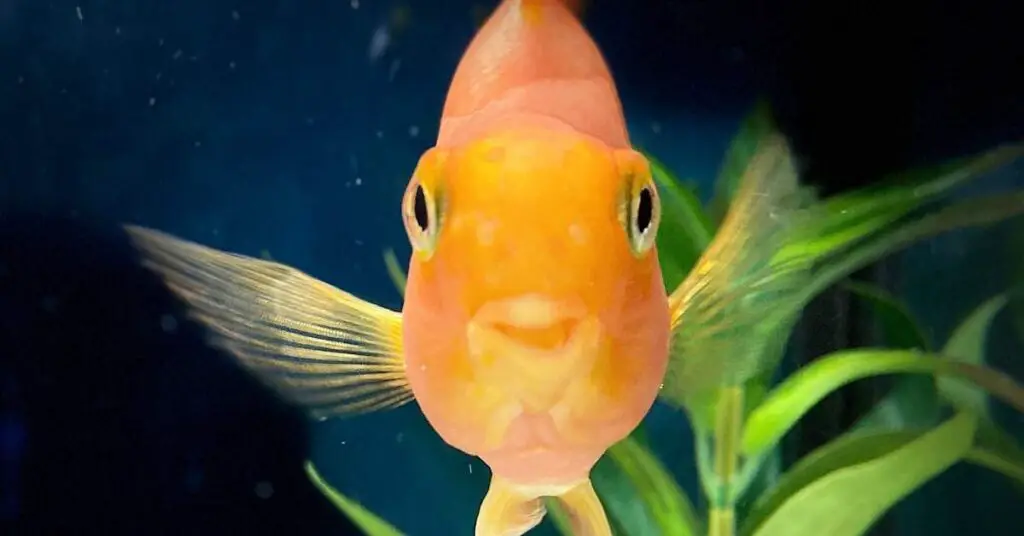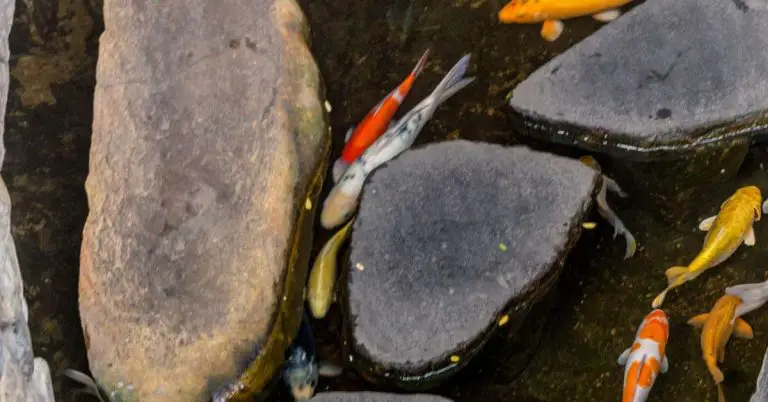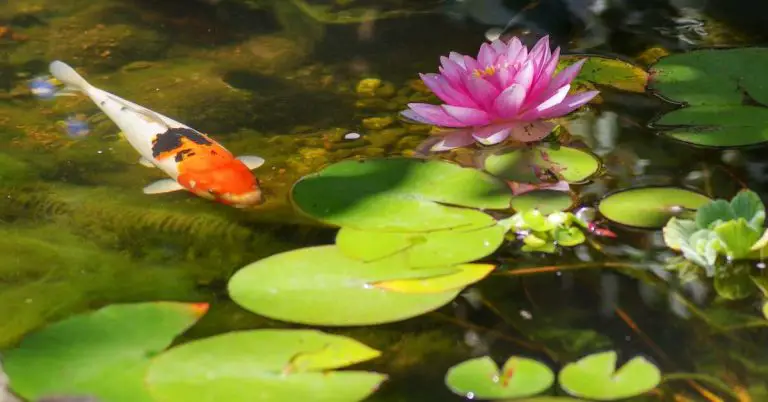Comforting A Dying Fish – How To Help Your Pet Fish Through Their Final Days
Taking care of the fish in your backyard pond or aquarium is no easy task, but what’s even more difficult is watching them pass away. Fish are pets just like any other and over time they become true members of the family. So it’s natural that many people wonder how to help comfort a dying fish through their final days.
In general, comforting a dying fish means keeping them happy, healthy and at peace. A dying fish is comforted greatly by having clean, warm water along with a safe and quiet environment without bright lights or loud noises. A dying fish should also be removed from any other aggressive fish in their tank and not overfed to avoid stomach pain or discomfort.
Perhaps your greatest task as a fish owner is taking care of their needs during their last and most difficult days. In the following article, I’ll give you tips and instructions that will hopefully make this big job a little easier for you.

How To Comfort A Dying Fish
Caring for and comforting a dying fish involves doing most of the same things you would do to keep them happy during their lifetime. I recently wrote another article on keeping betta fish happy which might be of some use to you if you’re dealing with a dying betta fish.
Related Post: How To Make Betta Fish Happy
How To Keep A Dying Fish Happy
Just like humans, fish find comfort in the things that make them happy. Here is a list of several things you can do to keep your fish happy and comforted during his or her dying days.
1. Good Water Quality
Water quality is essential to the health of any fish, but it’s especially important for fish that are dying. Dirty water causes stress and stress will only make their suffering worse and possibly lead them to an even earlier death.
To keep your water quality high, make sure you test it regularly to ensure it’s the proper pH level for your fish. Each kind of fish has different pH requirements so make sure to do your research and maintain the right pH level. You should also make sure that the pH doesn’t fluctuate much, as you would normally. A dying fish has very little tolerance for sudden pH changes, even if it’s within range for their species.
Related Post: What pH Level Is Best For A Koi Pond?
Here is a table of some common freshwater fish along with their recommended pH range.
| Common Fish | Recommended pH Range |
|---|---|
| Goldfish | 7.0 – 7.5 |
| Tiger Barb | 6.0 – 6.5 |
| Plectostumus | 5.0 -7.0 |
| Cardinal Tetra | 4.6 – 6.2 |
| Rams | 5.0 – 6.5 |
| Angelfish | 6.5 – 7.0 |
| Betta | 6.0 – 8.0 |
| Zebra | 6.5 – 7.0 |
| Hatchetfish | 6.0 – 7.0 |
| Danios | 6.0 – 8.0 |
| Clown Loach | 6.0 – 6.5 |
| Guppies | 7.0 – 8.5 |
| Harlequin Rasbora | 6.0 – 6.5 |
| Minnows | 6.0 – 8.0 |
| Silver Dollar | 6.0 – 7.0 |
It’s also important to make sure that your dying fish’s water is as clean as possible. This means making sure that there is no excess organic debris floating on top of the water or sitting at the bottom of the tank or pond. Any organic matter will eventually decay which creates toxic gasses and releases excess nutrients into the water. When this happens, it can fuel the growth of things like algae and other microorganisms that will deplete the levels of dissolved oxygen in the water.
Toxic gasses and low levels of oxygen are a leading cause of stress for fish which will undoubtedly cause them extra discomfort if they are dying.
You should also make sure that your fish’s water is properly oxygenated by running a pump or fountain, as you would normally. But don’t have the pump’s water pressure running too high or the current will be too strong for your dying and weakened fish to keep up with.
2. Warm Water
All fish have a temperature range that makes them most comfortable, whether they are a warm water or cold water fish. But dying fish may require a slightly warmer temperature than they would normally because they aren’t moving around and generating as much body heat.
A dying fish will also be comforted by as few fluctuations in their water temperature as possible. This can be difficult, especially if you’re dealing with an outside pond, but with an indoor fish tank you can minimize this by keeping your room’s temperature at a constant.
To make this easier for you, you can purchase a digital water thermometer with an alarm that alerts you if the water goes above or below a certain range.
You don’t want the water to be too warm as this can cause other problems with water quality, but try to aim to keep the water temperature in the upper ranges of whatever is the normal temperature range for your fish. Your dying fish will greatly appreciate the effort.
Here’s a list of some common freshwater fish along with their recommended temperature range. In the case of a dying fish, you’ll want to make sure your water is at the high end of these ranges to bring them maximum comfort.
| Common Fish | Recommended Temperature Range |
|---|---|
| Goldfish | 68F to 74F |
| Tiger Barb | 77F to 82F |
| Plectostumus | 75F to 82F |
| Cardinal Tetra | 73F to 81F |
| Rams | 84F to 86F |
| Angelfish | 78F to 84F |
| Betta | 75F to 80F |
| Zebra | 64F to 75F |
| Hatchetfish | 72F to 81F |
| Danios | 70F to 78F |
| Clown Loach | 77F to 86F |
| Guppies | 74F to 82F |
| Harlequin Rasbora | 72F to 82F |
| Minnows | 64F to 72F |
| Silver Dollar | 75F to 82F |
3. Don’t Overfeed
It goes without saying that you shouldn’t overfeed your fish. Just as with humans, eating too much causes poor health and digestive problems. It can also lead to bloating, which puts pressure on your organs and is uncomfortable.
It’s especially important not to overfeed a dying fish. A dying fish likely doesn’t have the appetite that it once did and may not be able to properly digest its food. A bloated belly is uncomfortable for anyone, especially if your fish’s body is compromised and near death.
You also shouldn’t overfeed because it will inevitably reduce the water quality for your fish. Any uneaten, excess food will decay and cause the same kinds of problems I talked about with dirty water above like lower oxygen levels and increased toxic gasses.
4. Peace & Quiet
Fish are not unaware of what’s going on around them, especially sound. Sound vibrations travel through the air and ground and reverberate strongly through water. Fish can hear these noises and can easily become stressed out or frightened by them.
This is why fish stores often have signs telling you not to tap on the glass of aquariums and fish tanks.
For precisely these reasons, you must ensure that your dying fish has as much peace and quiet as possible. This can be difficult if you’re dealing with an outside fish pond, but for an indoor fish tank this means making sure that any televisions or radios are kept at a reasonable volume. You should also make sure not to scream or shout near the fish tank either.
If you have young children, explain to them that your fish is dying and needs quiet so that it can live its final days in peace. Advise them not to tap or knock on the glass as well.
Keeping a quiet environment inside and outside of its tank will help keep your dying fish’s stress levels low and also allow it to get the rest it needs.
5. Remove Aggressive Fish
Fish love the company of other fish. Even betta fish, which are notorious for not getting along with other bettas, enjoy having other kinds of fish around for fun and to keep them from getting lonely.
But a dying fish usually likes to keep to him or herself. That doesn’t mean the fish needs to be all alone, however it will often prefer to find a secluded part of its pond or tank to rest.
This means it’s best to keep any particularly aggressive fish away from your dying fish. You can do this by either temporarily removing the aggressive fish or by putting the dying fish in its own tank. Making sure your dying fish isn’t constantly being annoyed or harassed by a bigger or younger fish with more energy will go a long way to bringing them much needed comfort.
Signs Your Fish Is Dying
You might be unsure if your fish is actually dying or if he or she is just having a bad day. Here are some tell-tale signs to look out for that your fish is seriously sick and possibly dying.
1. Not eating
Most fish typically have a strong appetite, meaning any food you give them they quickly gobble up. But if you notice one of your fish suddenly showing little interest in his or her food, it could be a sign that something is wrong.
Of course, this doesn’t mean you should worry if your fish isn’t eating all its food. If you find there is leftover food after feeding, it probably means you’re simply feeding them too much. But if one or more fish is showing no initial interest in the food to begin with, it’s probably something you should be concerned about.
2. Confusion And Unusual Behavior
A healthy fish should maintain a normal level of activity throughout the day along with occasional periods of rest. This can vary from fish to fish as some are more energetic than others, but you’ll quickly learn what behaviors are normal for your fish.
If you notice one or more of your fish is not behaving normally, this is often a sign of trouble. For example, if a fish that is normally darting from one end of its pond or tank to the other is suddenly sedentary or staying in one spot it could mean that this fish is sick or dying.
Another thing to watch out for is confusion or erratic behavior. Whether a fish is normally active or inactive, it should be swimming around its domain with purpose and straight ahead. So if you notice your fish is suddenly swimming sideways or seems confused, it’s a warning that its health is compromised.
3. Discoloration Of Fins Or Scales
If you see discoloration on your fish’s fins or scales it’s most likely a sign that something is wrong like a fungal or bacterial infection. This is especially true if you see white or fuzzy growths on their bodies.
If you notice your fish has discolored streaks on its fins, it’s usually a symptom of poor quality water with high levels of ammonia. Unless these issues are addressed quickly, it will likely lead to the death of the fish.
4. Bloating
Bloated fish bellies are a common symptom of a number of conditions and is often referred to as “dropsy” because of the way the belly drops down.
A fish’s belly can become swollen due to parasitic infection, fluid build up or organ disfunction and if left untreated can lead to death.
5. Popped Out Eyes
Popped out fish eyes is another symptom of a number of potentially fatal conditions including bacterial or parasitic infection.
Commonly known as “popeye disease”, or exophthalmia, it can affect either one or both eyes and should be addressed as soon as possible to avoid death.
6. Wants To Be Alone
Fish are social creatures just like humans and normally like to be in the company of other fish. If you have a fish that is suddenly wanting to be alone all the time, it’s often a warning sign that its health is compromised .
7. Breathing At Surface
If your fish appears to be gasping for air at the water’s surface, it’s a sign that its oxygen levels are low. This can either be because the water itself is low in oxygen or because the fish is having problems breathing or using its gills properly.
How To Revive Or Save A Sick Fish From Dying
Reviving a fish that is already unconscious or near death is not an easy task and should only be undertaken if you know exactly what you’re doing or as a last resort.
This is far from an exhaustive list but it includes many of the most common methods used to revive a dying fish.
- Place the fish in highly oxygenated water: This is a form of fish resuscitation that is used when a fish has passed out or become non responsive due to a lack of oxygen. It’s especially useful if the fish has jumped out of its water and is no longer able to breathe. This technique involves placing the fish on or near the oxygen exhaust in its tank or in a cool bowl of water. If a lack of oxygen is the issue, more often than not this will wake the fish back up.
- Gill Cleaning: If your fish is unable to breathe due to something blocking its gills, you can use clean hands or gloves to very gently brush away any debris or mucous. Be careful when performing this technique as you can easily damage its organs if you handle him or her too roughly.
- Salt Water treatment: When a fish is suspected to have an external parasitic infection, a salt water treatment can be particular effective. This involves preparing an isolated tank or bowl of water and filling it with a 3% salt water solution. The fish is then left to sit in the water for up to 30 minutes. Make sure the water is fully oxygenated with an air pump. During this time, monitor the fish closely and remove it if you notice any signs of distress.
- Garlic Water Treatment: Garlic and garlic water has been used for years to prevent parasites and to boost the immune systems of fish. The fish can either be dipped in garlic infused water or fed garlic.
- Chlorophyll Treatment: Chlorophyll can be added to your fish’s water to boost its health and to kill parasites, similar to the other treatments listed above.
How To Euthanize A Dying Fish
If you believe your fish is beyond saving, it might be worth considering euthanizing to prevent them from having to suffer unnecessarily.
There are several effective methods available to end your dying fish’s life but none of these should be performed unless you know what you’re doing or you risk your fish having to deal with an even more difficult death than if they had died naturally.
- Clove Oil – Clove oil is a natural and effective way to sedate your fish, and if the dose is high enough it can be used to humanely euthanize them as well. In general, 400mg of clove oil can be mixed with every liter of aquarium water and the fish should easily and comfortably pass within about 30 minutes.
- Anaesthetic Overdose: Similar to the clove oil method, pharmaceutical anesthetics can be dissolved into the fish’s water to safely and humanely put them to sleep. However, be advised that most anesthetics are not available for purchase without a prescription so should only be used on the advice of a veterinarian.
- Physical Methods: Various physical methods can be used to euthanize your fish such as brain pithing, decapitation and stunning. However, unless you’re skilled at doing this it’s probably not a good idea because if you fail, or don’t have the stomach, to finish the job, it can lead to more suffering for the fish than a natural death.
Do Fish Mourn Their Dead?
It’s natural to be curious about how your other fish pets will react to the death of their friend and fellow fish. Of course, we can’t ask a fish how they feel, but we do have very interesting research that can give us some insight into what they might be thinking.
It’s not known if fish mourn or grieve their dead as this is something that’s really only associated with mammals and birds. However, it’s not uncommon for fish to behave unusually when another fish dies due to a chemical called Schreckstoff that’s released when fish and other creatures are in distress.
Thankfully, though, it’s not very likely that fish mourn their dead. So if one of your fish dies, you probably don’t have to worry about the emotional health of their other fish companions.
Source: Do Animals Mourn Their Dead?
Mourning The Loss Of A Fish
You may feel a bit embarrassed about feeling strong emotions after the loss of a fish but this really shouldn’t be the case. Just because you don’t typically hear people talk about grieving the death of a fish doesn’t mean it isn’t completely natural or justified.
Don’t bury your emotions or not talk about how you’re feeling with someone you trust. Most people who have dealt with the loss of a pet will completely understand how you feel and be able to help you process the loss. You should also consider joining various fish groups online to talk about what you’re going through – these are exactly the kind of people who know about losing fish and will not minimize how you’re feeling.
Also, don’t blame yourself for your fish’s death. Caring for a fish is difficult and it’s common for fish owners to blame themselves for some need they may or may not have met. The most likely case is that you did everything you could to take care of your fish and their death was completely natural and unavoidable. Remember, fish have much shorter lifespans than humans or even other pets.
Related Questions
How Do You Help A Dying Fish?
The best way to help a dying fish is to provide him or her with clean water and a peaceful environment. This means testing your water’s pH levels and keeping it clear of debris. You should also be mindful to minimize any loud noises are strong vibrations nearby.
How Do You Let A Fish Die Peacefully?
Euthanizing a dying fish peacefully can be done using clove oil, benzocaine overdose or physical methods. Be sure to do plenty of research before attempting any kind of euthanasia technique to avoid pain or discomfort for you or your fish during the process.
Should You Kill A Dying Fish?
Whether or not you should kill a dying fish is subjective and depends on the condition of the fish and the sensibilities of the owner. However, if the fish appears to be confused or in pain you should probably consider ending his or her suffering.
How Do You Revive An Almost Dead Fish?
Once you’ve determined that your fish is still alive, there are several methods used to revive an almost dead fish. The first thing you should do is carefully clean the fish and make sure there is no debris blocking its gills. You can then attempt to place it in oxygenated cold water or perform various treatments using salt or chlorophyll.







